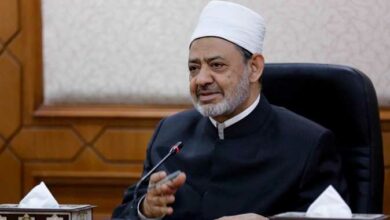The meteoric rise of the Muslim Brotherhood and Salafis in Egyptian politics has drawn attention, rather unfairly, away from another Islamist group that surpasses all others in its capacity for ideological revision and organizational innovation. Al-Jama’a Al-Islamiya (The Islamic Group) offers an interesting case of a formerly militant group that has renounced violence and attempted to merge into the political mainstream, all the while maintaining its distinct character.
Al-Jama’a is giving mixed signals that make it difficult to discern where they stand on the Islamist political spectrum, between the two poles of extremism and moderation. The group has long been engaged in a process of soul-searching, beginning with their famous non-violence initiative in 1997 and intensifying after the revolution, which has led to internal rifts. Members of Al-Jama’a are now divided into two factions – revisionists and militants – as they grapple with fundamental questions about the group’s mission and its strategies in the new Egypt.
The revisionists, led by veterans Najih Ibrahim and Karam Zohdi who were responsible for much of the group’s non-violence literature in the last decade and a half, champion self-critique and political re-orientation. Since their release from prison in 2002, Ibrahim and Zohdi have scaled up their activities. Within the power structures of the organization, they are weaker than the militants. But they do retain some control over the group’s presence in the Islamist public sphere.
The Al-Jama’a website, administered by Ibrahim himself, has become one of the most sophisticated Islamist forums in Egypt over the last few years, featuring discussions – with both Islamists and non-Islamists – about issues like Copts, women, cooperation with secularists, and arts and literature. Ideologically, Ibrahim and his followers are pioneering some of the most far-reaching revisions to Islamist doctrine in ages. They believe Islamists should not monopolize the representation of Islam and they’ve heralded self-critique as a forgotten Islamic duty. The revisionists’ main objective is to improve the group’s mission and social relevance. Topping their agenda are things like institutional legalization, the creative revision of spent doctrines and a move towards gradualist, peaceful activism. Meanwhile, Ibrahim cautions against traditional Islamist failings, like fanaticism, improper proselytizing and the wrongful application of Islamic sacred texts.
Al-Jama’a revisionists are quickly moving towards the center of the Islamist political spectrum, not far from Muslim Brotherhood reformists. They are eager to cooperate with other Islamists and have a keen interest in learning from the Turkish AK party’s experiences in government and economic development. However, the revisionists’ ideas do not hold much sway within the wider Al-Jama’a base (who number anywhere between 20,000 and 50,000 according to unofficial estimates). Many among the rank and file, who are searching for meaningful political identity and have undergone little social rehabilitation after being released from prison, continue to find the militants’ approach more re-assuring.
Militants, by contrast, are more orthodox; their renunciation of violence is one of their only major shifts since the 1990s. Their confrontational “old-style” politics has proved quite appealing to a group membership that is uneasily searching for a role in the unfamiliar political terrain of post-revolution Egypt.
Militants continue to maintain a strong grip over group affairs. Among them are powerful group members like Essam Derbala (the leader-elect), Safwat Abdel-Ghani (an increasingly popular figure among the group’s grassroots) and ‘Assem Abdel Maged (the Al-Gama’a spokesperson). Their reservations about Ibrahim and Zohdi’s leadership style over the last decades have occasionally prompted them to question the merits of the non-violence initiative, though never abandoning it wholesale. Still, many militants believe a better outcome could have been secured if Al-Jama’a had taken a different approach to the Egyptian state. Whether or not they are proud of their past atrocities is not exactly clear. The militants certainly renounce violence now, but contrary to the revisionists they may consider it to have been duly justified in the past.
The militants who in the past rejected party politics as a meaningless charade orchestrated by the former regime and questioned its religious legitimacy now embrace the establishment of parties on an Islamic basis. Their new Construction and Development Party claims a peaceful and constructive approach to politics, including participation in parliamentary and municipal elections. Having moved from outright rejectionism to a partial opposition against policies deemed un-Islamic or counter to popular interests, militants believe a new Islamist politics is in the making. But, whether or not their party will favor qualified political cadres over religious authorities remains to be seen.
The militants’ discourse on political participation may not differ much from that of the revisionists, but their unsavvy political language walls them off from the Egyptian revolutionary mainstream. Over the last few months, many have chosen to play the game of ideological polarization that has left Egyptian politics deeply divided between Islamists and non-Islamists. Like their allies in the conservative Islamist camp, the Al-Jama’a militants vehemently oppose any further escalation of street protests or confrontations with the Supreme Council of the Armed Forces (SCAF). They believe their party has a good chance of success in the upcoming parliamentary elections that should not be squandered on irrational political adventurism. And they see the SCAF, unlike the laic Turkish generals, as a potential guarantor of Egypt’s Islamic identity against the machinations of secular elites, as well as a provider of stability and security.
In the final analysis, Islamists in Egypt are closer to reform than revolution. In the long run they will be most concerned with issues like the relationship between religion and state, the reform of Al-Azhar (Egypt’s leading Islamic institution), and re-structuring the religious public sphere. These are all important issues that Islamists will begin to take up as the revolutionary dust settles and the transitional period draws to a close. In the process, Egyptian Islamists are likely to engage in new revisions and Al-Jama’a Al-Islamiya will be no exception.
Ashraf El-Sherif teaches at the American University in Cairo. He is a specialist on political Islam.




